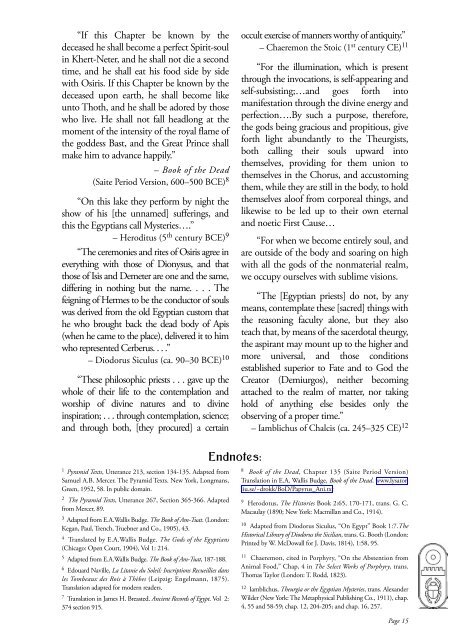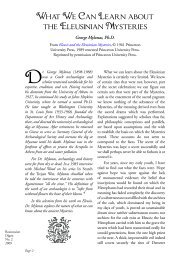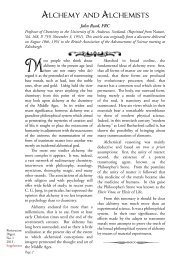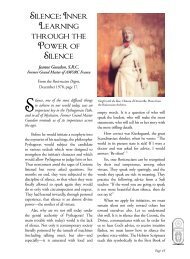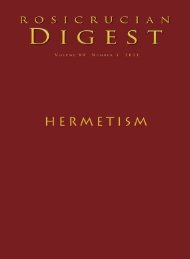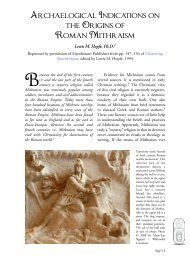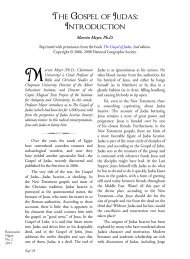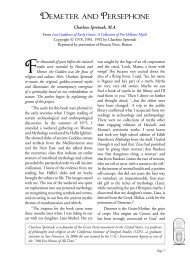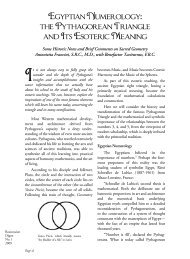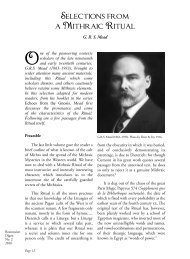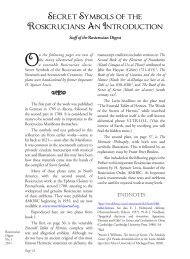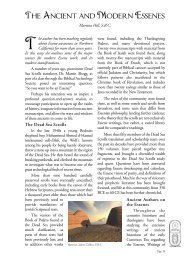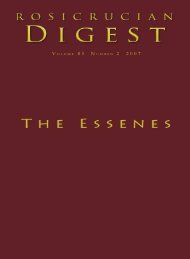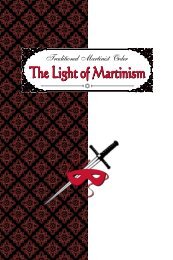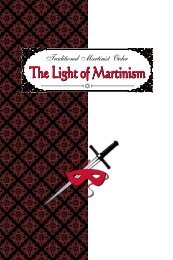Digest - Rosicrucian Order
Digest - Rosicrucian Order
Digest - Rosicrucian Order
You also want an ePaper? Increase the reach of your titles
YUMPU automatically turns print PDFs into web optimized ePapers that Google loves.
“If this Chapter be known by the<br />
deceased he shall become a perfect Spirit-soul<br />
in Khert-Neter, and he shall not die a second<br />
time, and he shall eat his food side by side<br />
with Osiris. If this Chapter be known by the<br />
deceased upon earth, he shall become like<br />
unto Thoth, and he shall be adored by those<br />
who live. He shall not fall headlong at the<br />
moment of the intensity of the royal flame of<br />
the goddess Bast, and the Great Prince shall<br />
make him to advance happily.”<br />
– Book of the Dead<br />
(Saite Period Version, 600–500 BCE) 8<br />
“On this lake they perform by night the<br />
show of his [the unnamed] sufferings, and<br />
this the Egyptians call Mysteries….”<br />
– Heroditus (5 th century BCE) 9<br />
“The ceremonies and rites of Osiris agree in<br />
everything with those of Dionysus, and that<br />
those of Isis and Demeter are one and the same,<br />
differing in nothing but the name. . . . The<br />
feigning of Hermes to be the conductor of souls<br />
was derived from the old Egyptian custom that<br />
he who brought back the dead body of Apis<br />
(when he came to the place), delivered it to him<br />
who represented Cerberus. . . .”<br />
– Diodorus Siculus (ca. 90–30 BCE) 10<br />
“These philosophic priests . . . gave up the<br />
whole of their life to the contemplation and<br />
worship of divine natures and to divine<br />
inspiration; . . . through contemplation, science;<br />
and through both, [they procured] a certain<br />
occult exercise of manners worthy of antiquity.”<br />
– Chaeremon the Stoic (1 st century CE) 11<br />
“For the illumination, which is present<br />
through the invocations, is self-appearing and<br />
self-subsisting;…and goes forth into<br />
manifestation through the divine energy and<br />
perfection….By such a purpose, therefore,<br />
the gods being gracious and propitious, give<br />
forth light abundantly to the Theurgists,<br />
both calling their souls upward into<br />
themselves, providing for them union to<br />
themselves in the Chorus, and accustoming<br />
them, while they are still in the body, to hold<br />
themselves aloof from corporeal things, and<br />
likewise to be led up to their own eternal<br />
and noetic First Cause…<br />
“For when we become entirely soul, and<br />
are outside of the body and soaring on high<br />
with all the gods of the nonmaterial realm,<br />
we occupy ourselves with sublime visions.<br />
“The [Egyptian priests] do not, by any<br />
means, contemplate these [sacred] things with<br />
the reasoning faculty alone, but they also<br />
teach that, by means of the sacerdotal theurgy,<br />
the aspirant may mount up to the higher and<br />
more universal, and those conditions<br />
established superior to Fate and to God the<br />
Creator (Demiurgos), neither becoming<br />
attached to the realm of matter, nor taking<br />
hold of anything else besides only the<br />
observing of a proper time.”<br />
– Iamblichus of Chalcis (ca. 245–325 CE) 12<br />
1 Pyramid Texts, Utterance 213, section 134-135. Adapted from<br />
Samuel A.B. Mercer. The Pyramid Texts. New York, Longmans,<br />
Green, 1952, 58. In public domain.<br />
2 The Pyramid Texts, Utterance 267, Section 365-366. Adapted<br />
from Mercer, 89.<br />
3 Adapted from E.A.Wallis Budge. The Book of Am-Tuat. (London:<br />
Kegan, Paul, Trench, Truebner and Co., 1905), 43.<br />
4 Translated by E.A.Wallis Budge. The Gods of the Egyptians<br />
(Chicago: Open Court, 1904), Vol 1: 214.<br />
5 Adapted from E.A.Wallis Budge. The Book of Am-Tuat, 187-188.<br />
6 Edouard Naville, La Litanie du Soleil: Inscriptions Recueillies dans<br />
les Tombeaux des Rois à Thèbes (Leipzig: Engelmann, 1875).<br />
Translation adapted for modern readers.<br />
7 Translation in James H. Breasted. Ancient Records of Egypt. Vol 2:<br />
374 section 915.<br />
8 Book of the Dead, Chapter 135 (Saite Period Version)<br />
Translation in E.A. Wallis Budge, Book of the Dead. www.lysator.<br />
liu.se/~drokk/BoD/Papyrus_Ani.txt<br />
9 Herodotus, The Histories Book 2:65, 170-171, trans. G. C.<br />
Macaulay (1890; New York: Macmillan and Co., 1914).<br />
10 Adapted from Diodorus Siculus, “On Egypt” Book 1:7.The<br />
Historical Library of Diodorus the Sicilian, trans. G. Booth (London:<br />
Printed by W. McDowall for J. Davis, 1814), 1:58, 95.<br />
11 Chaeremon, cited in Porphyry, “On the Abstention from<br />
Animal Food,” Chap, 4 in The Select Works of Porphyry, trans.<br />
Thomas Taylor (London: T. Rodd, 1823).<br />
12 Iamblichus, Theurgia or the Egyptian Mysteries, trans. Alexander<br />
Wilder (New York: The Metaphysical Publishing Co., 1911), chap.<br />
4, 55 and 58-59; chap. 12, 204-205; and chap. 16, 257.<br />
Page 15


